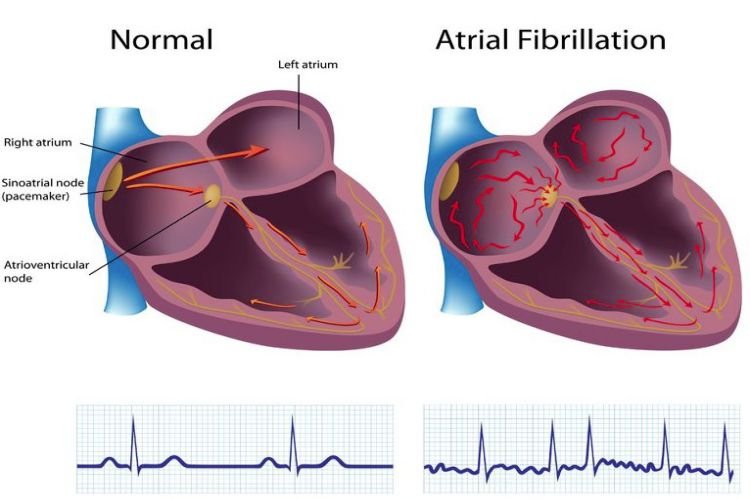 Irregular heartbeat refers to atrial fibrillation (AFib/ AF). This disorder can create more health challenges like stroke, heart failure, and blood clots. You may not notice any symptoms, but their impact on your life can be threatening. In an ordinary course, the heart’s upper chambers’ muscle fibers contract to empty blood into the lower sections. However, the disorder disturbs the contraction process due to the occurrence of fast electrical signals.
Irregular heartbeat refers to atrial fibrillation (AFib/ AF). This disorder can create more health challenges like stroke, heart failure, and blood clots. You may not notice any symptoms, but their impact on your life can be threatening. In an ordinary course, the heart’s upper chambers’ muscle fibers contract to empty blood into the lower sections. However, the disorder disturbs the contraction process due to the occurrence of fast electrical signals.
Consequently, some blood can stay in the upper chamber and create a pool. Because of this affected performance, one can develop atrial fibrillation. It can be a permanent or temporary disorder. Some people may need emergency care. AFib is one of the common diagnoses in clinics. More than two to six million Americans suffer from the disease, which can rise to 12.1 million by 2030. People aged less than 65 forms about 2% of the population suffering from this heart ailment. However, this percentage becomes significantly higher (about 9%) in the case of 65 and older people.
Causes and symptoms
Atrial fibrillation can be of four types – Paroxysmal, persistent, permanent, and long-standing persistent. Paroxysmal disorder can occur and vanish suddenly without any sign. It can resolve in 24 hours or one week. Doctors may refer to this condition as persistent atrial fibrillation if it goes beyond one week. When it persists beyond a year, they term it long-standing persistent AFib. And if it persists even after treatment, you can call it a permanent problem. Some common causes of the disease include high BP, heart failure or other heart ailments, rheumatic heart, obesity, hyperthyroidism, sleep apnea, diabetes, lung or kidney disease, etc. It can also be hereditary. Mortality risks are higher in this disorder. Older people are most vulnerable to the disease.
Although it may not show signs, some people can look for signals like pain in the chest, extreme fatigue, dizziness, irregular heartbeat, confusion, etc. One has to be careful with their health if they catch this disease because it increases stroke risks for them by five times.
Treatment and prevention
Lifestyle tweaks, surgery, and medicines can help improve this condition. The focus remains on reducing blood clots and taking care of the heartbeat. In treatment, doctors usually recommend blood thinners like Eliquis. Check pharmacies where you can get the lowest price for Eliquis. Your medical bill will drastically reduce. If you want to avoid this health complication, keep your heart healthy through well-maintained cholesterol, weight, triglyceride, and blood pressure levels. Since weight management is essential to check hospitalization and other unwanted scenarios, you must focus on this. Eating a low-cholesterol diet can help with this. Supply yourself with lots of whole grains, fruits, and vegetables. Daily exercising is also necessary. Reduce your alcohol and caffeine intake. Do you smoke? Please leave this habit.
Timely and routine health checkups can keep most of your health woes at bay or prevent them from worsening. Although healthcare cost is high at this stage, you have many ways to lower your spending while enjoying the proper care. So, keep your heart healthy and safe. After all, you want it to beat the right way.




